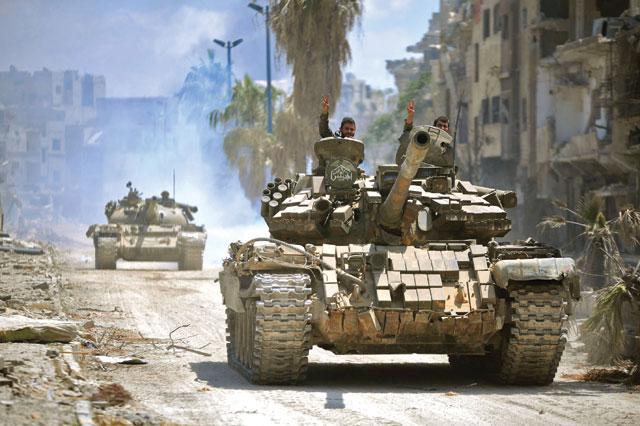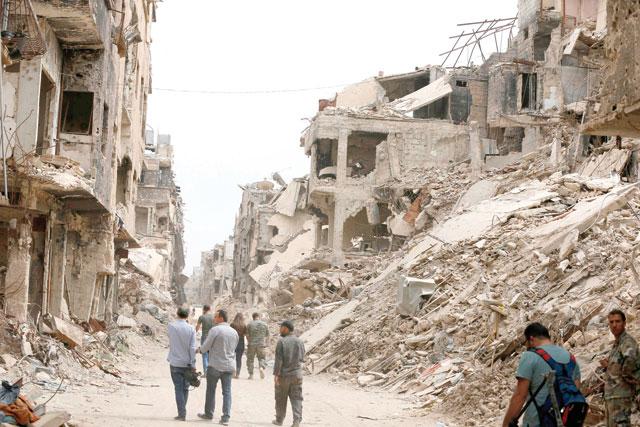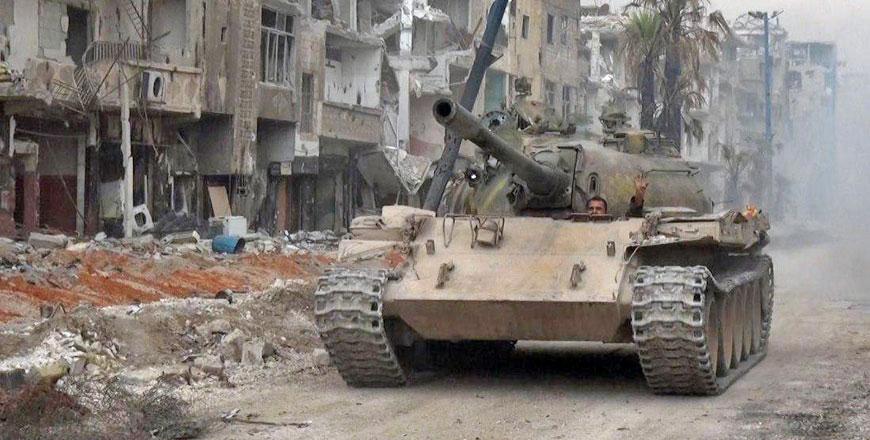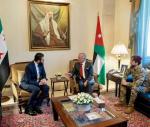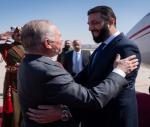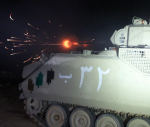You are here
Yarmouk, an epicentre of Syria's bloody conflict
By AFP - May 21,2018 - Last updated at May 21,2018
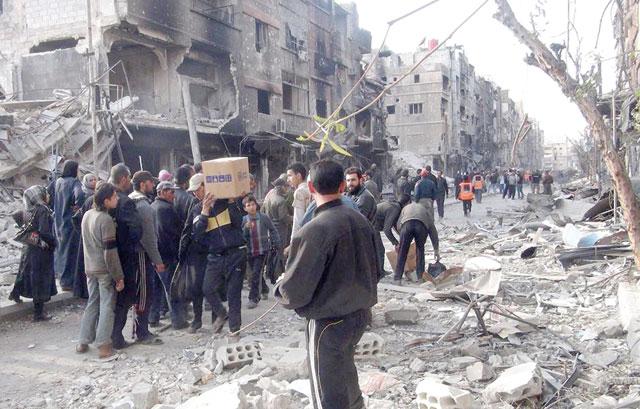
Residents of Syria's besieged Yarmouk Palestinian refugee camp, south of Damascus, stand amidst debris as they wait to receive food parcels on March 24, 2014 (AFP photo)
BEIRUT, Lebanon — Poverty and exile, siege and starvation, militant rule and government shelling — few places have seen more suffering in Syria's seven year, atrocity-filled war than the Palestinian camp of Yarmouk.
A striking 2014 picture of tired, gaunt-looking residents massing among the ruins for a food distribution drew comparisons with a World War II ghetto and became a symbol of the Syrian conflict.
The gutted neighbourhood in southern Damascus was the Daesh group's last urban redoubt until Monday, when the last batch of militants evacuated after weeks of fighting.
The area was once Syria's biggest Palestinian refugee camp, home to around 160,000 people.
Years of crippling siege and bombardment by the regime of President Bashar Assad, whose presidential compound is visible from the camp, had already sent tens of thousands of them into a second exile.
Yarmouk is one of the closest spots to central Damascus to have been controlled by Daesh and the deal brokered in recent days to secure the militants’ exit handed the government full control of the capital and its outskirts for the first time since 2012.
Government and allied forces turned their attention to Yarmouk and adjacent neighbourhoods in the south of Damascus last month after focusing their efforts on the rebel enclave of Eastern Ghouta earlier this year.
Around 1,000 fighters remained in the Yarmouk area at the time, of which at least 233 were killed in this month's fighting, according to the Syrian Observatory for Human Rights monitoring group.
Most of them were former members of Al Qaeda's Syrian ex-affiliate Al Nusra Front, but Daesh fighters there also included Palestinian refugees who joined when the hard-liners took over much of the camp in 2015.
According to the Britain-based observatory, the Syrian army led the battle, with Russian officers supervising and Palestinian militias contributing hundreds of foot soldiers.
Daesh militants posted several grisly pictures on their social media accounts purportedly showing regime or allied fighters they beheaded during the operation, which the observatory said also left more than 250 pro-regime fighters dead.
Iconic picture
Yarmouk camp was opened in 1957 with tents set up for Palestinian families forced to flee their homes by the establishment of Israel. These were soon replaced by permanent structures.
The wider area of Yarmouk was also home to hundreds of thousands of Syrians.
In 2011, regime attempts to use the traditionally apolitical Palestinian refugee community to raise tensions with Israel and divert attention from the internal uprising in Syria backfired.
Syrian opposition groups came to see Yarmouk as a potential forward base in their campaign to unseat Assad. The fighting that ensued levelled the area and forced most residents to flee.
According to the United Nations' agency for Palestinian refugees UNRWA, most of the camp's 6,000 residents have been displaced by the recent fighting.
The agency's spokesman Chris Gunness said he was "deeply concerned" about them.
Yarmouk, which was meant as haven for displaced Palestinians, had come to symbolise a humanitarian catastrophe that caused some of the worst displacement since World War II.
A picture taken during a UN food distribution in January 2014 gripped the world's imagination.
The photo — depicting thousands of haggard-looking civilians thronging the ruins of their neighbourhood as they waited for a food handout — drew parallels with the Warsaw ghetto, even in the Israeli press.
Gunness, the UNRWA spokesman, said that year: "The lexicon of man's inhumanity to man has a new word: Yarmouk."
Stories of children eating paper, families surviving on animal feed, and outbreaks of typhoid made Yarmouk a cause celebre, contributing to the global pressure on Assad.
Related Articles
BEIRUT, Lebanon — Syrian regime forces on Tuesday retook a neighbourhood south of Damascus from Daesh, slicing off yet another part of the m
BEIRUT/DAMASCUS — The UN on Tuesday said it was almost impossible to imagine people returning to Syria's ruined Yarmouk Palestinian camp, a
BEIEUT, Lebanon — At least 86 pro-regime fighters were killed in Syria over the past week in battles against Daesh as regime forces push to


